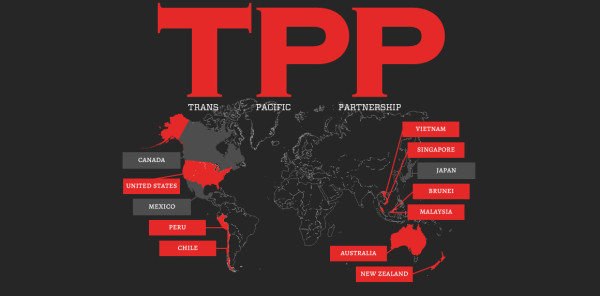The proposed Trans-Pacific Partnership (TPP) is a controversial regulatory and trade initiative. It is designed to integrate and coordinate the economies of the so-called Asia-Pacific region along global market-based lines.
The signature trade proposal of the Obama administration, the TPP is being aggressively marketed as an economic growth initiative that will spread general prosperity to all the member states. This is a doubtful proposition.
The TPP takes in approximately 40 percent of the global economy, and includes the national economies of Australia, Brunei, Canada, Chile, Japan, Malaysia, Mexico, New Zealand, Peru, Singapore, the United States, and Viet Nam. As an integrated economic regionalization bloc, the TPP will lubricate large-scale corporate foreign investment patterns, deepen growing global/local economic and social inequalities, undermine labor and human rights, degrade the environment, and weaken local decision centers.
The scale and scope of the initiative is a game changer. Clearly, the proposed participants represent large and small economies in the global north and south that are marked by distinct and unequal differences in their respective productive forces. Inequalities in economic structures don’t bode well for regulatory integration. They foster unbalanced relationships that generate local dependency on external forces, trigger debilitating socio-economic disruptions, and gave rise to top-down non-inclusive repressive regimes in the global south. A reading of the historical record, in this regard, indicates that unequal market relations unravel and trump local institutions, democracy, and the common good.
With the fall of the Berlin Wall in 1989, the triumphant market-economy has accelerated and generalized the global spread of privatization, deregulation, and flexible labor markets. These economic reforms, based on a market-based fundamentalism, supports an optimistic turbo-charged speculative financial marketplace that highlights the search for global corporate super profits over sustainable economic investments. Global and regional integration, in this sense, economically favors the few over the many while also increasing global economic instability.
This new phase in the global market has ushered in a host of new geographical regional/territorial arrangements – that deepen the unequal economic links between the global north and south – such as the North American Free Trade Agreement (NAFTA), the United States – Colombian Trade Promotion Agreement (CTPA), and the Korean – U.S. Free Trade Agreement (KORUS-FTA).
These so-called free trade agreements are templates for the TPP and give serious pause for concern. To provide just one noxious economic example, NAFTA has resulted in the devastation of the Mexican agricultural sector, increased the importation of crucial foodstuffs, created untenable and on-going balance of payment issues, and expelled economically “redundant” rural farmers and workers from their livelihoods and homes.
These economic dislocations have dramatically increased Mexican out-migration to the U.S. and fanned a toxic nativist reaction that polarizes the American political landscape along worrisome exclusionary lines. This problem has been compounded by the massive outsourcing of well-paying jobs to low-wage Mexico, and increasing levels of income inequality in the U.S. In short, the economic benefits of growth, in large part, flow to global corporate interest at the expense of workers on both sides of the U.S Mexican border.
The TPP initiative is being packaged and peddled as an efficient and common sense mode of shared economic development. This is simply not the case. Approval and implementation will serve to strengthen the corrosive economic, social, and economic dimensions of globalization and lead us into the economic “heart of darkness.”
Arturo Ignacio Sánchez, Ph.D. is chairperson of the New Yorkers Committee of Queens Community Board 3. He has also taught courses on immigration and entrepreneurship at Barnard College, The City University of New York, Columbia University, and Cornell University.






